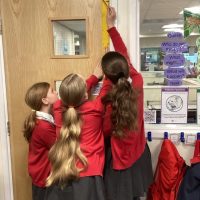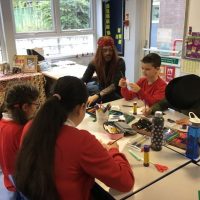“So teach [us] to number our days, that we may apply [our] hearts unto wisdom.”
Psalms 90:12
Our over-arching curriculum intent for all subjects is based on the acronym INSPIRE (Independence, Nurture, Skills, Progress, Individual, Resilience, Encourage):
Our Mathematics Curriculum is led by Mrs Bannister:
Intent:
Maths is a journey and long-term goal, achieved through exploration, clarification, practice and application over time. At each stage of learning, children should be able to demonstrate a deep, conceptual understanding of the topic and be able to build on this over time.
There are 3 levels of learning:
- Shallow learning:surface, temporary, often lost
- Deep learning:it sticks, can be recalled and used
- Deepest learning:can be transferred and applied in different contexts
The deep and deepest levels are what we are aiming for by teaching maths using the Mastery approach.
We intend to do this by:
- Ensuring our children access a high quality maths curriculum that is challenging, has real life connections and is enjoyable.
- Providing our children with a variety of mathematical opportunities, which will enable them to make the connections in learning needed to enjoy greater depth in learning.
- Ensuring children are confident mathematicians who are not afraid to take risks.
- Fully developing independent learners with inquisitive minds who have secure mathematical foundations and an interest in self-improvement.
Implementation:
Our implementation is developed through secure understanding of the curriculum and subject:
Planning
- Long term: National Curriculum
- Medium term: Yearly overview, up-dated annually in response to data and in house monitoring of teaching & learning. White Rose resources are used as a basis for medium term planning.
- Short term: –
- Daily lessons include a clear lesson intention ‘I can’ and sometimes success criteria ‘Steps to Success’. This may be recorded in the children’s books
- Daily lessons are often taught in 3 parts: basic skills, main & plenary (not necessarily at the end of a lesson). Teachers use their professional judgement in how to deliver daily lessons. We make use of calculation clinics to test recall of basic skills and fluency. We incorporate where necessary:
Concrete, pictorial, abstract
Objects, pictures, words, numbers and symbols are everywhere. The mastery approach incorporates all of these to help children explore and demonstrate mathematical ideas, enrich their learning experience and deepen understanding. Together, these elements help cement knowledge so pupils truly understand what they’ve learnt.
All pupils, when introduced to a key new concept, should have the opportunity to build competency in this topic by taking this approach. Pupils are encouraged to physically represent mathematical concepts. Objects and pictures are used to demonstrate and visualise abstract ideas, alongside numbers and symbols.
Concrete – children have the opportunity to use concrete objects and manipulatives to help them understand and explain what they are doing.
Pictorial – children then build on this concrete approach by using pictorial representations, which can then be used to reason and solve problems.
Abstract – With the foundations firmly laid, children can move to an abstract approach using numbers and key concepts with confidence.
Short term planning is supported by the use of the White Rose Maths Hub materials, our school calculation policy, NCETM and NRICH.
Teaching – ‘Quality first teaching’ linked to teaching standards:
All teachers:
- ‘Know where their children are through the use of concise summative assessment, prior learning, assessment, maths talk;
- ‘Understand where their children need to be’ through a secure understanding of year group expectations and/or pre key stage expectations and incisive, ongoing, formative assessment;
- ‘Know how they are going to get them there’ through the use of a range of strategies to promote independence, mastery and high expectations of ALL;
- Effectively deploy adults, specifically during introductions, plenaries & catch-up sessions;
- Plan for progression during and between lessons.
Assessment
- Summative/reported – NFER
- Standardisation (YR – Y6)
- Summative/ diagnostic (where necessary) – White Rose, NCETM
- Formative / ongoing – * See Marking, Assessment & Feedback policy
- Prior & Post learning – informs future planning, demonstrates progress in books, celebrates effort and achievement.
- Children reflect on their own learning at key times each half term.
Standardisation:
standardisation meetings
Moderation:
- In-house
- Cross-school
- Subject Leader Meetings
All of the above will be monitored and discussed during pupil progress meeting and staff performance management.
Impact:
What impact has the above had on:
- Quick recall of facts and procedures
- The flexibility and fluidity to move between different contexts and representations of mathematics.
- The ability to recognise relationships and make connections in mathematics
A mathematical concept or skill has been mastered when a child can show it in multiple ways, using the mathematical language to explain their ideas, and can independently apply the concept to new problems in unfamiliar situations.
These will be assessed through: assessment, tracking, pupil progress meetings, performance management, moderation and standardisation
In this section
[child_pages list=”true”]









